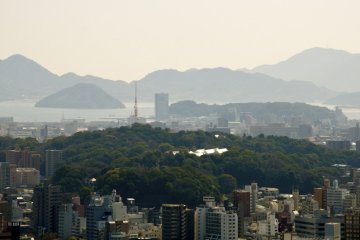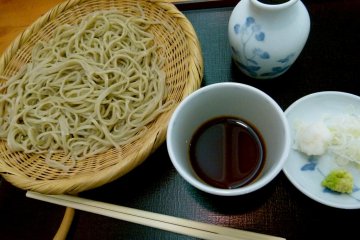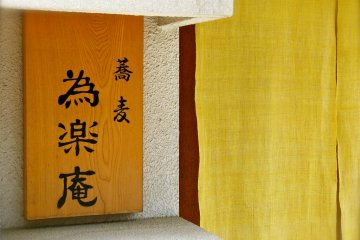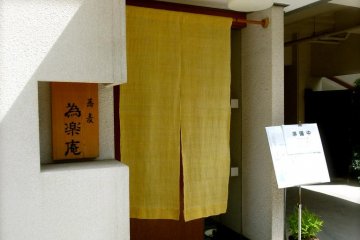It’s appropriate that this sophisticated soba restaurant, recently given a star in the Hiroshima Michelin guide, would be the place for me to get schooled in the art of proper soba eating. And I wasn’t the only one.
Iraku-an has been serving delicious, homemade soba noodles in a classy and tranquil environment since 2002. I’ve read that some newly anointed Michelin star restaurants in Japan have complained that their sudden popularity makes it hard to keep up previous standards. However, it doesn’t seem like Iraku-an’s newfound fame will impact their obvious commitment to serving the highest quality soba possible.
Although they couldn’t have been nicer despite my rather inappropriate dress (cycling clothes), it was clear from the moment I walked in that they take their food very seriously and expect their customers to do the same. On the table next to me, some businesspeople were waiting for their lunch and one was called away to answer a phone call. While he was outside (since phones are not allowed in Iraku-an), the food arrived and the staff mentioned that he should not miss the chance to eat while the food was freshly served. A few minutes later, the chef again mentioned that the food wouldn’t taste quite right if it wasn’t eaten soon, which sent his colleague outside to encourage the absent diner in. When he re-entered he apologized and later enthusiastically apologized again when he paid. I was really surprised- you don’t often see people taking food this seriously outside of the highest class sushi or tempura shop in Japan.
In my own case, once served I checked on which condiments to add to which sauce and was kindly told to add my sauce and radish, wasabi and other condiments slowly and with care as I ate my Zaru soba noodles. Apparently it is better to add the condiments on top of the noodles in the sauce cup as you ready eat bite. I was also advised on the art of diluting the dipping sauce with the hot water the soba noodles were cooked in to drink after the meal. When the chef brought out the teapot (filled with the hot soba water), I made the mistake of drinking it from my tea cup (oh no no no). I’m not sure how I have lived here as an avid soba eater for nearly 20 years and not learned this yet. It was nice to finally be set straight. Indeed, good food which is prepared well demands respect and appreciation.
The menu is the same at lunch and dinner. It is only written in Japanese, but is quite simple: cold (Zaru) soba, hot soba noodles served in different ways: Kake (plain),Kitsune (with sweet tofu topping), Tanuki (tempura batter topped) and Nisshin soba (hot soba noodles topped with fish and green onion). There is also miso soup, grilled Kamo (duck) 鴨, grilled Kamo soup, Dashi broth with egg soup and Mattcha sorbet for dessert. As you sit down, you are served a light buckwheat tea, other drinks include beers and JapaneseNihonshu sake including Niigata’s premium sake Hakkaisan.
There is seating for 16 people at 6 different tables. The table at the back for 6 is next to a large window looking into a Japanese style garden. The interior is clean, modern-minimalist Japanese. There is a glass walled showroom with a giant red lacquer bowl and long rolling poles hanging on the walls where the soba is prepared fresh daily. Another feature showing quality and freshness of ingredients is the electric mill at the front of the shop. As I ate it was grinding the buckwheat into flour to be used for the following day’s soba noodles.
It’s not really family-friendly if you have small children (or noisy ones), there is a sign at the door kindly asking diners not to bring in children under 3. It may seem overly strict, but once you sit in quiet sanctuary enjoying your soba noodles, while looking out on the back garden’s stone statues, you can somewhat appreciate the rule.
- No reservations
- Parking for 1 car available and 100 yen parking nearby
- No credit cards
- Not kid friendly (and sign asking not to bring in kids under 3)
- All seats are non-smoking all day
Open: 11:30-14:00 / 18:00-20:00 Closed Wednesdays and the 1st and 3rd Tuesday of the month. No lunch hours on Sundays.









